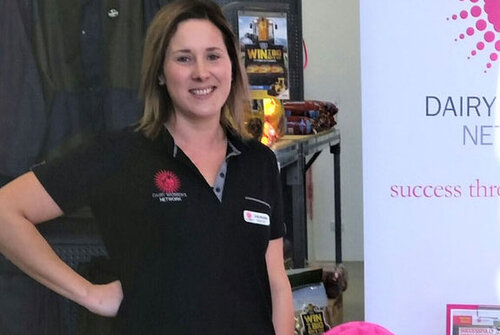Southland Farmer Tackles HR Issues with Diploma
16 October 2019
Having won the 2007 national Farm Manager of the Year Award with her husband, Daniel, Emily Woolsey had a pretty good grasp of dairy farming – yet she knew there was so much more to learn.
 The 32 year-old was busy juggling her career as an Occupational Therapist in Invercargill then raising two sons, so had never worked on their farm fulltime.
The 32 year-old was busy juggling her career as an Occupational Therapist in Invercargill then raising two sons, so had never worked on their farm fulltime.
But a recent move back to a family-owned property in Gorge Rd to become equity managers overseeing two dairy units (comprising 1300 cows in total), as well as overseeing a second equity partnership in a 400 cow property, prompted Emily to further her own education and farming career by enrolling in Primary ITO’s diploma (Level 5) last year.
“I decided I wanted to know more about operating an agribusiness,” she explained. “I’ve learned a lot from other people over the years but I’ve also had to teach myself along the way. So I was aware there were gaps in my knowledge and I thought the diploma could help fill those gaps.”
So far she’s completed the diploma’s human resources module which has helped streamline the couple’s own HR practices when dealing with their six full-time and two part-time staff.
“What I found beneficial was putting together a folder for successful recruitment and managing an effective on-farm team. I’ve been able to tweak certain areas of our HR practice and tailor resources to suit our business.
“Just looking at things like the interview process – what questions should we be asking in an interview. The success of your business all starts from the recruitment process and finding the right person to hire. The diploma’s HR module looks at all the critical areas to consider when employing someone.”
Emily says she’s now about to introduce formal performance reviews as a result of her study to keep staff motivated and help them develop and improve. “Farming often seems to lack a formal process where people can look at their strengths and weaknesses. Having a proper review helps people with their industry progression.”
She’s now tackling the diploma’s finance module which is also proving extremely useful. “I can sit down now and really look at the budget figures and understand what they actually mean and what impact they will have on our cash flows going forward.
“I also feel I am becoming more confident in having those conversations with our bank manager and accountant because now I understand what all the terminology means.”
Emily says overall the diploma is worthwhile because it’s specific to agriculture rather than just a general business course. “I can directly relate it to our farming business. I’m an examples person so I love the fact all the examples relate to our agribusiness.”
She attends classroom lessons once a fortnight and enjoys the face-to-face contact with fellow students to discuss what systems and ideas they use on their farm and what challenges they face.
“Our tutor has been very good. If you do get stuck, you can easily contact him for help and motivation. He’s also very good at challenging our ideas and thoughts about why we do what we’re doing and looking at the big picture which is always good.”
Emily says finding time to study in amongst family and farm life is always a challenge. Her advice is to remind yourself why you are doing the diploma and put time aside to get your assessments done.
“Don’t go in with a pre-determined idea of what you think you might learn because I have learned far more than I expected,” she adds.
One of the reasons the dairy industry appeals so much to Emily is the progression pathways that exist. “It’s a challenge but there’s definitely ways to improve yourself, grow your business and enjoy your lifestyle. We’ve got two young boys who love being out on the farm with us. There’s not many jobs where you can take your kids to work with you.”
She also loves how many positive people are involved in dairy farming and how willing people are to share their knowledge and experience to help others. She’s been heavily involved in the Dairy Women’s Network in recent years and says there are plenty of opportunities to extend your skills.
“The cool thing about dairy farming is we’re all in it together. We’re not competing against each other. I think we’re very fortunate to have industry organisations like Dairy NZ, Dairy Women’s Network and Primary ITO to help us grow and develop.”
